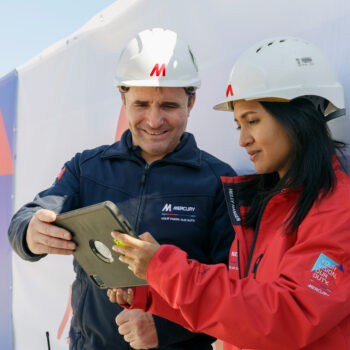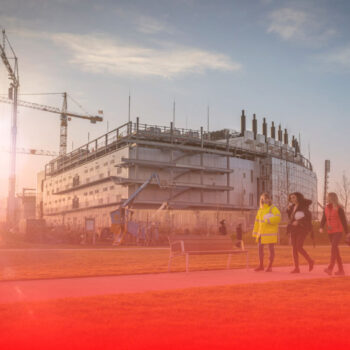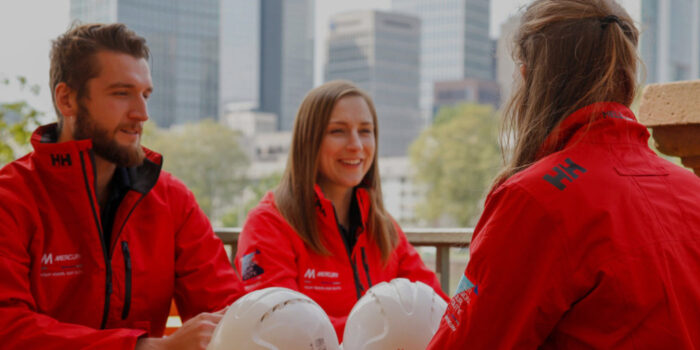Mercury’s Alan Clinton, Operations Director of Data Centres & Building Services was recently interviewed by Enterprise Ireland Benelux, and spoke about sustainability within the construction industry. Read the full article in English below.
Click here to read the original article in Dutch.
The Irish company Mercury is committed to maximum sustainability in the construction sector
Across the world, Irish companies set the pace for high-tech innovative construction. Belgium is no exception: it’s a strong market for construction services from Irish companies. The value of Irish construction exports to Belux in 2019 was 32.3 million euros, a 32% increase from 2018.
Today the global construction sector has a major challenge to tackle. The industry accounts for a full 40% of global carbon emissions. Urgent action is needed to slash those emissions. Here, Irish companies are again forging ahead, using digitization to pioneer sustainable practices.
Mercury, a General Contractor & Engineering company founded in Dublin, has worked on projects across four continents and is currently primarily focused on Europe. Amongst Mercury’s projects in Belgium is the company’s work on the high street Primark stores in Brussels and Antwerp and for Xtraterm in Feluy who manufacture insulation for energy efficient buildings. Mercury aims to raise the bar for better sustainability practices and to play a role in helping the EU reach its Green Deal goal to become the world’s first “climate-neutral bloc” by 2050.
Data center construction is a significant business for Mercury. Alan Clinton is Operations Director for Data Centers & Building Services Business Unit at Mercury and is determined to help overcome the particular sustainability challenges that data centers represent. “Europe will need more and more data centers as our societies rapidly digitize. We have no choice but to be ambitious and relentless in reducing their carbon footprint” says Alan. He and his team are developing and applying several game-changing sustainability principles to their construction of data centers.
Firstly, sustainability must be integrated at the design phase of any project. Sustainability used to be considered only when a data center was already operating. Then the focus turned to the construction phase. But for a project to be truly sustainable, the right practices need to be already embedded in the design stage. For example, Mercury is about to pilot an innovate system to measure the carbon footprint of each material – also known as embodied carbon – in a building. Measurement is essential to be able to effectively manage the levels of embodied carbon.
Secondly, the right project management & planning tools are critical. Mercury uses a tool called BIM 360, for planning, reporting, modelling and quality control during the full life cycle of the project. Mercury is going to the next level by using Synchro 4D planning, a tool that integrates with BIM 360 to connect all the project stakeholders – contractors, subcontractors, suppliers, construction managers, owners – and more. Combining both tools brings benefits such as just-in-time deliveries of exact quantities of supplies, vastly reducing waste and transportation.

Thirdly, companies must bring their ecosystem of partners and suppliers on board. “Sustainable procurement is a really effective way to move the needle” says Alan. For example, Mercury regularly works with Interxion, A Digital Realty Company, a global provider of carrier and cloud-neutral colocation data centre services that puts data center sustainability at the forefront of its operations. Together with its client Interxion, Mercury has ambitions to deliver a “zero waste” data center construction in the near future with its client Interxion, Mercury has ambitions to deliver a “zero waste” data center construction in the near future.

Finally, Alan believes that “post Covid-19 we will all need to rethink what’s normal”. The pandemic has forced companies to change working practices, and many new practices are more sustainable. “We need to ask the questions: does everyone need to travel to be on site? Do we need so much transportation for supplies?”
Innovative practices like these are part of what puts Mercury and Ireland on the map for data centers. Ireland is viewed as the “European data capital” and a hub for global tech giants. Irish contractors are delivering data centres in Ireland, the UK and all across continental Europe. The total planned investment for Irish data centers amounts to 9.3 billion euro in 2021 and will amount to 5.75 billion euros globally until 2025.
We are at the beginning of a new chapter in data center sustainability. Irish companies like Mercury will help the industry’s ambition – underscored by its recent Climate Neutral Data Centre Pact – to make all data centres in Europe climate neutral by 2030.



